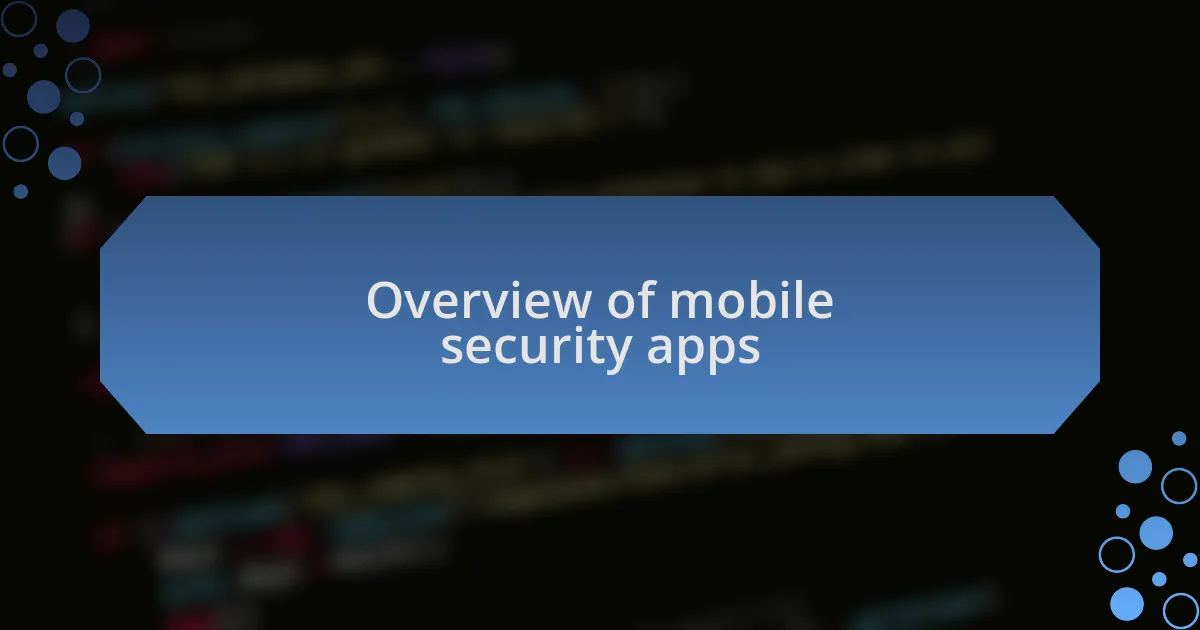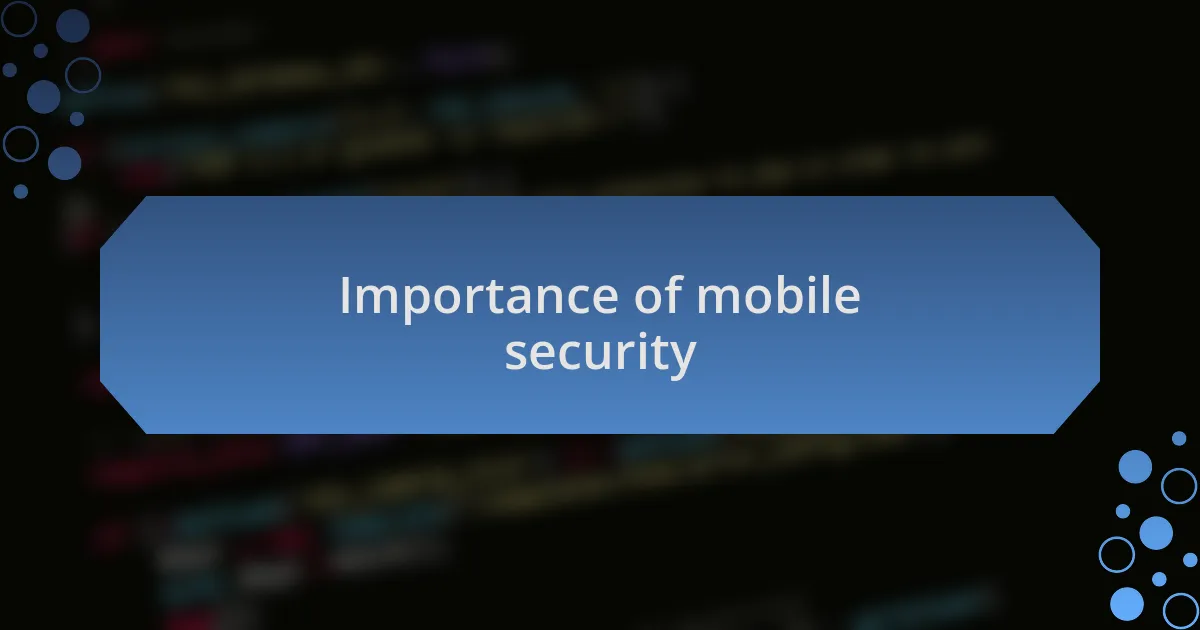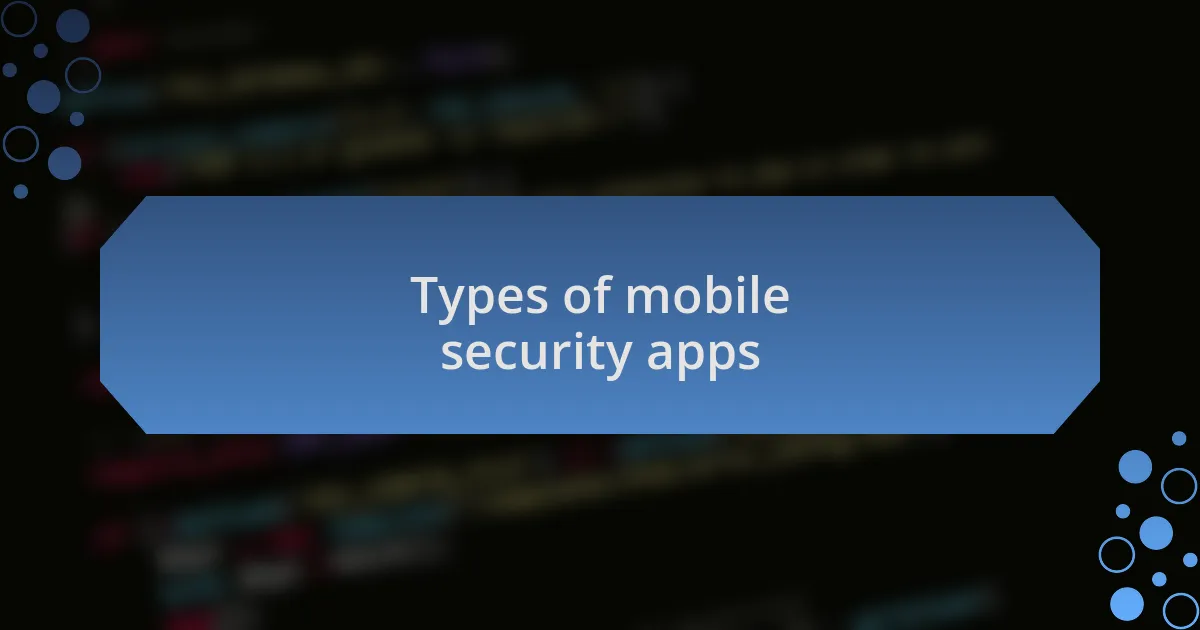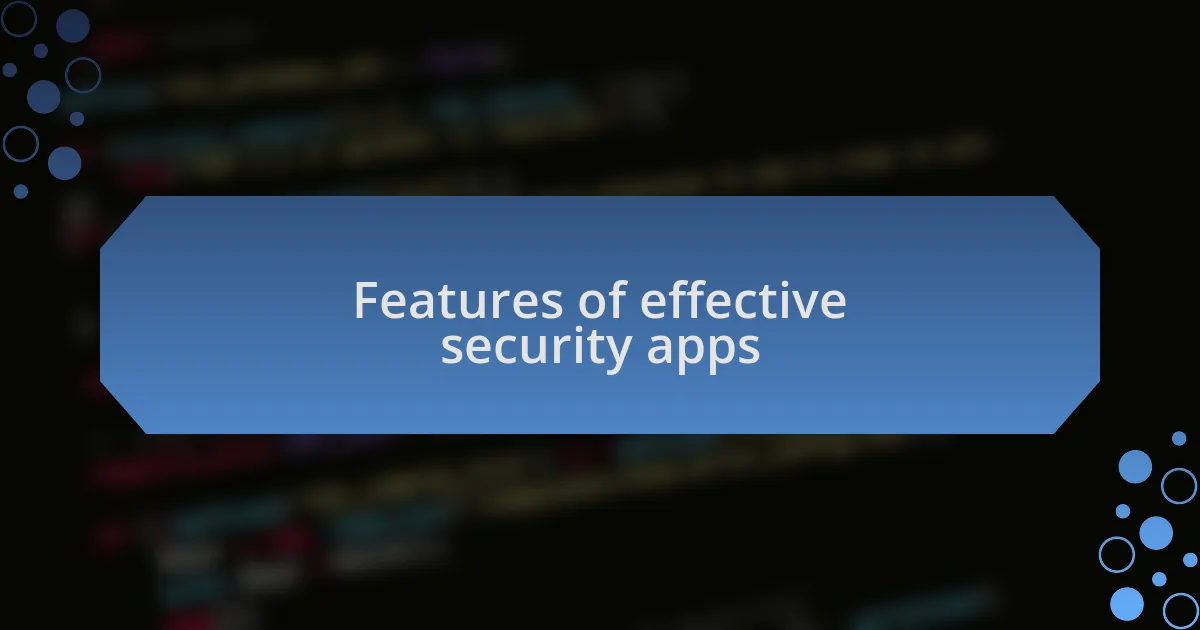Key takeaways:
- Mobile security apps are essential in protecting personal information, offering features like real-time alerts and VPN services that enhance online privacy.
- Continuous updates are crucial for maintaining device safety, as ignoring them can lead to vulnerabilities against emerging threats.
- Effective mobile security apps should have user-friendly designs, real-time threat detection, and strong customer support for optimal usability and reassurance.
- Choosing the right security app involves considering performance, privacy respect, and strong user reviews rather than just flashy features.

Overview of mobile security apps
Mobile security apps have become essential tools for safeguarding our personal information and devices. From my experience, the increasing number of cyber threats makes it clear that these applications are not just optional anymore; they’re a necessity. When I first downloaded a security app, I felt an immediate sense of relief, knowing that my sensitive data was being monitored.
What really surprised me was how intuitive these apps can be. I remember using one that offered real-time alerts for suspicious activity, which made me feel almost like I had a digital bodyguard. Have you ever wondered how you would react if your personal data was compromised? For me, it was a wake-up call that reinforced the importance of having robust mobile security.
Additionally, many security apps now provide features like anti-theft alerts and VPN services, which enhance our online privacy. I recall using a VPN when connected to public Wi-Fi, and it felt liberating to browse without the constant worry of hackers lurking around. It’s fascinating how much peace of mind these tools can provide, addressing both practical needs and emotional security.

Importance of mobile security
The value of mobile security cannot be overstated, especially as our lives become increasingly intertwined with technology. I remember the first time I saw an alert pop up showing a potential phishing attempt on my phone. My heart raced. It made me realize that mobile security isn’t just about preventing theft; it’s about protecting the very fabric of our daily routines and interactions.
One particularly eye-opening experience occurred when a friend of mine fell victim to a malware attack on her smartphone. It completely disrupted her life, leading to lost contacts, personal data breaches, and financial headaches. This incident reaffirmed my conviction that investing in mobile security is akin to investing in our digital well-being. Who wouldn’t want to avoid such vulnerabilities? The choice seems clear: prioritize security or face the consequences.
Moreover, mobile security is not only about defense but also about empowerment. After I installed a comprehensive security app, I felt more in control of my digital footprint. It was like having a security blanket for my phone. Can you imagine how comforting that would be in a world filled with ever-evolving threats? The reassurance that comes with proactive measures significantly changes how we interact online, allowing us to engage with our devices without the constant shadow of fear lurking behind us.

Types of mobile security apps
When it comes to mobile security apps, they can generally be classified into a few key types, each serving a unique purpose. For instance, antivirus apps are critical in scanning for malware and protecting against various threats. I recall when I first downloaded an antivirus app; it felt like having a virtual shield in my pocket, diligently working to keep my phone safe without me having to constantly check for issues.
Another category worth noting is privacy-focused apps, which help you manage permissions and safeguard your sensitive information. I used one that monitored which apps accessed my contacts and location, and it was surprising to discover just how many apps requested unnecessary permissions. It raised a lot of questions about what we choose to share and what could happen if we don’t pay attention. Having that level of control over my data was not only empowering but essential in a world where personal information can be easily exploited.
Lastly, there are anti-theft apps that provide features like remote locking and locating your device if it goes missing. I vividly remember when my friend’s phone was stolen; the ability to track it down using an anti-theft app gave her a sense of hope in a frustrating situation. It made me realize that aside from preventive measures, having tools to react quickly in an emergency is just as crucial for mobile security. How prepared are you to handle a similar situation?

Features of effective security apps
When evaluating effective mobile security apps, one key feature to look for is real-time threat detection. I remember the peace of mind that came with an app that immediately alerted me to any suspicious activity on my device. It felt like having a vigilant guardian watching over my digital life, allowing me to act swiftly before potential threats turned into serious problems.
Another important aspect is user-friendly design. I’ve encountered security apps that, while robust in features, were cumbersome to navigate. A streamlined interface not only made management easier but also helped me feel more in control of my security settings. After all, if an app is too complicated, how likely are we to use it regularly and effectively?
Lastly, robust customer support can make a significant difference. I had an experience where I needed assistance with a feature and was pleasantly surprised by responsive and knowledgeable support staff. Having that backup not only reassured me about the app’s reliability but also encouraged me to explore its full potential, knowing help was just a message away. Isn’t it comforting to know that you’re not alone when it comes to your mobile security?

My criteria for app selection
When selecting a mobile security app, I prioritize performance and efficiency. There was a time when I downloaded an app that significantly slowed down my phone, which was frustrating. I need an app that works seamlessly, providing thorough security without hindering my device’s speed or functionality.
Another consideration for me is privacy. I vividly recall reading the privacy policy of an app that raised red flags regarding data sharing. It’s crucial for me to choose an app that respects my privacy and doesn’t compromise my personal information. After all, isn’t the point of security to protect our data, not expose it further?
Finally, I look for strong reviews and community feedback. I remember relying on user reviews when I was uncertain about an app, weighing pros and cons before making my choice. Hearing about others’ experiences not only guides my decision but also gives me the confidence that the app I choose has a solid reputation among those who share my concerns about security.

Lessons learned from my experience
When it comes to learning lessons from my experience with mobile security apps, one key takeaway is the importance of continuous updates. I once ignored the update notifications from an app, and it ended up being vulnerable to a new security threat. This taught me that staying proactive and keeping the app up-to-date is crucial in maintaining my device’s safety.
Another lesson that struck me was the significance of features versus necessity. There was a time I got drawn in by flashy features that I never used, only to realize I didn’t need half of them. It’s easy to get caught up in what seems innovative, but I now focus on functionality that truly enhances my security experience and not just what looks good on paper.
Lastly, I’ve learned that not all security apps are created equal, even those that are well-reviewed. I recall trying a highly lauded app that surprisingly failed to protect against malware threats I had encountered. This reinforced my belief that firsthand experience combined with ongoing research is vital; it’s one thing to read a review, but it’s another to personally assess how an app performs in real-world scenarios.